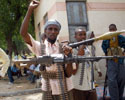
The American government has recently come under fire from the United Nations for its restrictions on aid to Somalia. Accusing the U.S. of politicizing aid, U.N. officials say that by withholding tens of millions of dollars, the U.S. government has prevented humanitarian aid from reaching Somalis in desperate need of food.
In January alone, 63,000 people were displaced in Somalia due to fighting between government forces and militias—this, on the heels of the World Food Program decision to suspend operations (a decision that would cut food aid off to one million Somalis) because of insecurity and militant threats.
U.N. official Mark Bowden said, “What we are seeing is a politicization of humanitarian issues. No U.N. agency has paid any money to al-Shabaab.”
The U.S. decided to hold back funding because of concerns that aid and money were being diverted to al-Shabaab, an Islamist militant group with ties to al-Qaeda that the U.S. has designated a terrorist group. Specifically, U.S. officials believed that contractors in charge of distributing food aid were being forced to pay fees to al-Shabaab in order to access many areas in need.
On Friday, State Department spokesman Philip J. Crowley defended the decision, emphasizing that blame should not fall to the United States or World Food Program:
"The idea that we have somehow politicized aid in Somalia is patently false. If there’s blame to go around here, it is al-Shabaab that – through its attack on the Transitional Federal Government, the checkpoints it’s set up around the country, it is impeding the flow of assistance to millions of Somalis. They’re the ones who are at fault here, and they’re the ones that have caused the UN and the World Food Program to suspend its assistance."
Toward the end of last year, the U.S. made continued aid contingent on U.N. agencies agreeing to monitor deliveries more closely. The U.N. refused, arguing that the restrictions would make distributions nearly impossible.
According to Jeffrey Gettleman of the New York Times, the newest restrictions state that aid agencies receiving U.S. money “cannot pay fees at road blocks, ports, warehouses, airfields, or other transit points” controlled by al-Shabaab – difficult, to say the least, given that the militant group controls more than half of south-central Somalia.
While the Obama administration is clearly concerned about where food aid ultimately ends up, there has been much less attention paid to the lack of restrictions surrounding U.S. military assistance. Though reports from the U.N. and Amnesty International have documented significant arms leakages from the Somali government to the very insurgents they are fighting, the U.S. has only upped its military assistance in the past year.
Last May, the U.S. government applied for an embargo exemption to supply up to $2 million in cash to Mogadishu for the procurement of military materials. During a visit to the region in August, Secretary of State Hillary Clinton pledged strong support for the Transitional Federal Government, amid reports from the State Department that the U.S. had shipped military supplies to the Somali government throughout the spring.
Photo: Anti-government fighter in Mogadishu. (AP)

